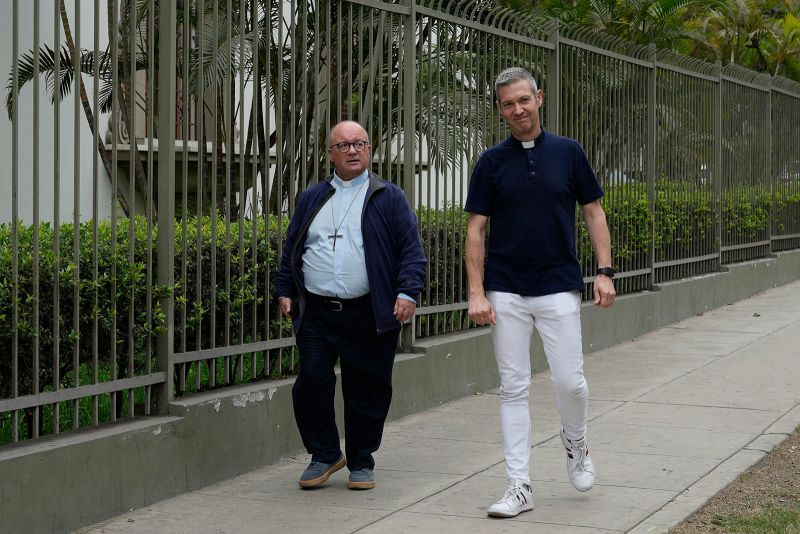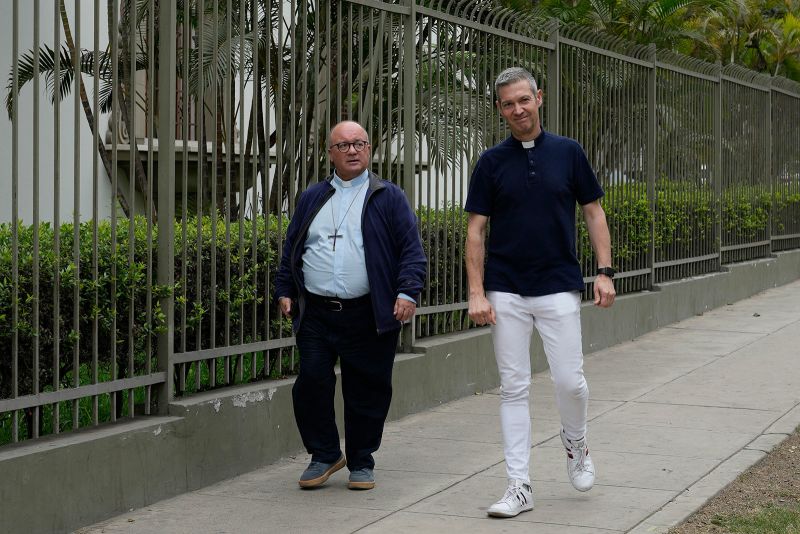
Like many victims of sexual abuse, it took years for Santiago to acknowledge that he was raped as a teenager.
Four decades on, he is still waiting for a measure of justice to address his claims against Sodalitium Christianae Vitae (SCV), a secretive Roman Catholic society founded in Peru that has been mired in scandal since its layman founder Luis Fernando Figari and other senior members were accused of sexually abusing numerous adult and minor recruits.
Santiago says that he was sexually abused by Figari at least three times in the 1970s, when he turned 17. He recalled Figari leading him to a room and raping him, saying it was “the only way to correctly see his aura.”
He doesn’t clearly remember other incidents. “It is difficult to count because your brain starts to block things, I have tried, but there are some memories that are blocked,” he said.
Santiago is among the dozens of reported victims who have been waiting eagerly for the Vatican to reveal its findings about the SCV allegations, after a months-long investigation.
SCV has already admitted that sexual, physical and psychological abuse took place. In 2017, it removed Figari from the group and published a two-part report by international experts that found that more than a dozen men and three women alleged being sexually abused by SCV members when they were young adults.
In the report’s preface, SCV asked for “forgiveness from each person that has been hurt by a member or a former member of the Sodalitium,” and said the organization was “committed to a process of self-examination and of change.”
Now the case has moved into the hands of church authorities in Vatican City, whom victims hope will be able to take serious measures including disbanding the entire organization.
As part of the ongoing investigation, the Vatican sent letters to several SCV members in February giving them 45 days to respond to allegations of abuse, according to a source familiar with the investigation. Vatican top abuse investigators, Archbishop Charles Scicluna and Monsignor Jordi Bertomeu, made a surprise visit to Lima in July 2023, interviewing victims including Santiago and SCV representatives, among others.
For now, it is unclear when the investigation results will be delivered, or in what form. But in August last year, Pope Francis confirmed to reporters, “We are working on this. We are trying to bring the situation to light.”
Decades of ‘impunity’
An explosive 2015 book by journalists Salinas and Paola Ugaz revealed 30 anonymous testimonies from SCV victims including Santiago’s, shocking conservative Peruvian society but only resulting in failed leadership reforms and an ongoing court case against the group that has largely gone nowhere.
In the book, titled “Half Monks, Half Soldiers,” former SCV members detailed that once the recruits reached the legal age, 18, they were encouraged to leave home and cut ties with family and friends.
Teenagers who were recruited were brainwashed “to become a kind of zombie, a robot, a fanatic, where there is a syncretism that mixes the Catholic religion with fascist ideas – Spanish fascism,” according to Salinas, who says he himself was physically and psychologically abused at the Sodalitium when he was a teenager.
Figari was seen as a charismatic figure, but he was also described by former and current members as “vulgar, vindictive, manipulative, racist, sexist, elitist, and obsessed with sexual issues and the sexual orientation of SCV members,” the 2017 SCV report found.
It added that Figari committed “multiple acts of sodomy of a minor male and a young adult male,” filmed young recruits “in their underwear or bathing suits,” and directed them to perform sex acts on each other and himself, all under the justification of it being part of their spiritual formation.
Figari denied all the allegations publicly for the first time in 2016. “I’m innocent, totally innocent. I come here to tell the truth because the authorities have not allowed me to speak,” Figari told reporters in Rome.
Military training and alleged sexual abuse
At the age of 15, Figari told him he had great mental powers and offered to train him in ancient techniques, Santiago said. Part of this training involved Santiago only wearing underwear and sitting on Figari’s leg, he said. On another occasion, Figari made Santiago and another minor sit in the lotus position and asked them to touch each other, including their genitals, Santiago said.
Years later, Santiago first reported his abuse to SCV members and filed a complaint against Figari at Lima’s Archdiocesan Tribunal in 2011. He did not get an official response or follow up, he said.
According to the 2017 SCV report, Figari also imposed military training, gleaned from movies he watched, on the young recruits: Young boys were ordered to swim “in cold ocean waters for several hours at a time” late at night or very early in the morning, run long distances in severe weather and sleep on floors or stairs.
He eventually joined SCV’s team as community leader 10 years later but said he regrets potentially playing a part in the psychological abuse of other young recruits. “After making my complaint I thought: “How many people I have also affected?,” he said, adding that he has since “called many people to ask for forgiveness.”
SCV declined to be interviewed for this article, saying they are fully cooperating with the Vatican’s inquiry and highlighted a private audience between its General Superior Jose David Correa and Pope Francis on December 1, when they shared “updated information about the organization.”
The search for justice
According to Salinas and other victims, the steps toward accountability taken by SCV so far are not enough. They want to see the perpetrators formally punished and the organization dissolved.
The Peruvian legal system so far has not led to any resolution. A criminal case in Peru against Figari and other SCV members was dropped by Peru’s prosecutor’s office in 2017, with prosecutors saying none of the alleged sexual abuse victims had come forward and that the alleged crimes fell outside the statute of limitations. A separate case on allegations of kidnapping, serious psychological injuries, and illicit association to commit a crime, is still working its way through the justice system.
His clients demand “this organization to stop and (that) harm does not continue to be caused to new children, teenagers or young people in Peru and in other several countries where it has expanded,” he said. “Sodalitium is still active.”
Salinas, who has written to Pope Francis about the case, is pinning his hopes for justice on the Vatican’s investigation.
The Vatican has the power to dissolve SCV – a measure that Peruvian Cardinal Pedro Barreto has already called for. Pope Francis could also order sweeping reforms of the group, including the expulsion of members and special measures that must be followed.
And the Pope recently changed the church’s Code of Canon Law in 2021 to make lay people who hold an office in the church accountable for abuse, which would appear to apply to Figari, who is not a cleric. Church penalties for him could include fines, removal from all offices and expulsion from SCV.
For the victims, it’s about being heard and recognized after so many years.
EDITOR’S NOTE: Anyone affected by sexual violence can reach out to the National Sexual Assault Hotline at 800-656-HOPE (4673) or visit online.rainn.org to receive support via confidential online chat.

